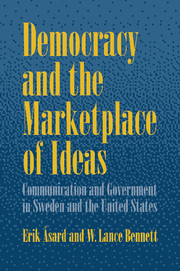Book contents
- Frontmatter
- Contents
- Preface
- Acknowledgments
- Part I The Marketplace of Ideas
- Part II The Great Twentieth-Century Governing Ideas
- Part III Rhetoric and Government: Understanding Public Policy and Elections
- 5 Idea Markets and the Policy Process: Tax Reform in Sweden and the United States
- 6 The Marketplace of Ideas in Elections and Campaign Rhetoric
- Part IV Making Democracy Work
- Notes
- References
- Index
6 - The Marketplace of Ideas in Elections and Campaign Rhetoric
from Part III - Rhetoric and Government: Understanding Public Policy and Elections
Published online by Cambridge University Press: 12 October 2018
- Frontmatter
- Contents
- Preface
- Acknowledgments
- Part I The Marketplace of Ideas
- Part II The Great Twentieth-Century Governing Ideas
- Part III Rhetoric and Government: Understanding Public Policy and Elections
- 5 Idea Markets and the Policy Process: Tax Reform in Sweden and the United States
- 6 The Marketplace of Ideas in Elections and Campaign Rhetoric
- Part IV Making Democracy Work
- Notes
- References
- Index
Summary
Campaigns are the conversation of democracy, and the one that just concluded was angry, deeply personal, powerfully ideological and exceedingly negative…. Many experts worry that negative advertising reached new highs — or lows - in the 1994 [U.S.] campaign and only insured that the voters would remain angry and cynical about their politicians… Still, many scholars and politicians argue that incremental reforms are unlikely to truly change the nature of the political debate. Campaigns do not happen in a vacuum, they say “Why should people expect politics to be any different from the rest of the culture?” asked Representative Barney Frank,
Democrat of Massachusetts. “It's not as if politics is deteriorating but everybody's watching Shakespeare “ Mr. [Thomas] Mann also noted that anger and cynicism are not unique to the United States. “I worry a lot about the fraying of the civic culture, but we have to understand what is going on around the world,” he said. “There's a lot of undifferentiated animus toward elites, suspicion of government and politics and an unwillingness to strike out.” Angry times, in other words, breed angry campaigns. What is less clear, however, is how the cycle ever ends.
- Robin TonerThe four regulatory mechanisms referred to throughout this book have clear implications for elections. During the course of an election campaign, parties and candidates, according to traditional democratic theory, present - or should present - their views and positions on a broad range of issues and face each other in open debate. In an ideal electoral marketplace that is devoid of market disturbances among the regulatory mechanisms, the free flow of ideas ensures that the voters are well informed about the issues and alternatives and thus are able to make an enlightened choice. T h e mass media are instrumental in ensuring that ideas, issues, and candidates are widely and fairly covered to enable the electorate to choose between competing viewpoints. Ideally and theoretically, at least, election campaigns should enrich the public dialogue and strengthen the democratic process.
- Type
- Chapter
- Information
- Democracy and the Marketplace of IdeasCommunication and Government in Sweden and the United States, pp. 142 - 174Publisher: Cambridge University PressPrint publication year: 1997



